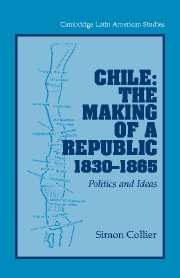Book contents
- Frontmatter
- Contents
- Acknowledgments
- Abbreviations Used in the Notes
- Introduction
- PART I THE NEW REPUBLIC, 1830–1865
- PART II FROM PORTALES TO MONTT, 1835–1851
- PART III MID-CENTURY ATTITUDES
- PART IV ORDER AND LIBERTY, 1851–1864
- 9 The Conservative Defection, 1851–1858
- 10 The Triumph of Liberty, 1859–1864
- Sources
- Index
9 - The Conservative Defection, 1851–1858
Published online by Cambridge University Press: 24 July 2009
- Frontmatter
- Contents
- Acknowledgments
- Abbreviations Used in the Notes
- Introduction
- PART I THE NEW REPUBLIC, 1830–1865
- PART II FROM PORTALES TO MONTT, 1835–1851
- PART III MID-CENTURY ATTITUDES
- PART IV ORDER AND LIBERTY, 1851–1864
- 9 The Conservative Defection, 1851–1858
- 10 The Triumph of Liberty, 1859–1864
- Sources
- Index
Summary
Montt's First Term, and an Omen from Atacama
The first two Conservative presidents had been generals, both of them heroes of independence. Manuel Montt, the first civilian to govern Chile for any length of time, had neither the military prestige of his predecessor nor the patrician detachment of his successor. He made up for it by sheer willpower. His slightly dark appearance (el negro was his widely known family nickname) was a target for the snobbery of some of the older upper-class families. Portales himself had spotted his capacity for hard work and his administrative talent, something Montt never forgot. He was a man of few words, outwardly unemotional and dry, although unfailingly polite in his private dealings. “All head and no heart” was his predecessor's private opinion.
The government's victory in the 1851 civil war guaranteed the triumph of the authoritarian pelucón tendency. British rear admiral Sir Fairfax Moresby toasted Montt early in 1852 (in language once applied to William Pitt the Younger) as “the good pilot” who had guided Chile through the storm. The banquets held to mark the end of the civil war acclaimed Montt in similar terms but also rubbed salt in the wounds of the defeated opposition. The publisher Santos Tornero, attending a Valparaiso banquet in late December 1851, sensed a definite spirit of “rigor” in the air. “I am the brother of all Chileans,” declared Pedro León Gallo at a similar feast in Santiago.
- Type
- Chapter
- Information
- Chile: The Making of a Republic, 1830–1865Politics and Ideas, pp. 191 - 222Publisher: Cambridge University PressPrint publication year: 2003



